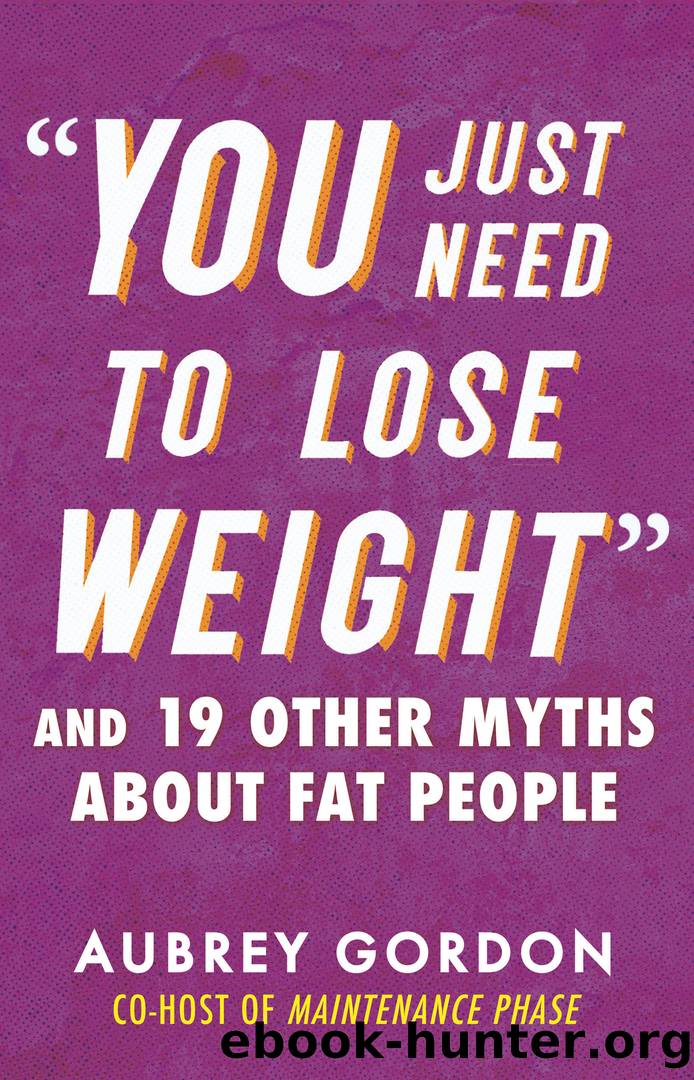You Just Need to Lose Weight by Aubrey Gordon

Author:Aubrey Gordon [Gordon, Aubrey]
Language: eng
Format: epub
Publisher: Beacon Press
Published: 2023-01-15T00:00:00+00:00
Despite the panel not being able to define a âdisease,â those working in medicine and medical research seemed to show growing support for considering âobesityâ (newly redefined) to be a âdiseaseâ (as yet undefined). The panel, too, suggested that re-framing fatness as a disease could increase public understanding of fatness not as a personal failing but as an illness that could befall someone through little fault of their own. Without frameworks for âdisease,â the panel looked instead to social indicators. Ultimately, socialânot scientificâreasons led to their adoption of fatness as a new disease.
By 2013, the American Medical Association (AMA) followed in the footsteps of the Obesity Society by officially recognizing obesity as a disease. The press pointed to what it seemed to consider promising possible outcomes: greater understanding from physicians for their fat patients and increased insurance coverage for weight-loss programs, drugs, and surgeries. (They largely did not note that the majority of clinical treatments for fatness failed to produce sustained, significant weight loss for a majority of patients.) The AMAâs decision to recognize obesity as a disease drew public attention, not only because of its significance but also its apparent controversy within the organization. The organization had asked its Council on Science and Public Health to study the question, which the council had spent a full year doing. Ultimately, the council advised against the reclassification of obesity as a disease âmainly because the measure usually used to define obesity, the body mass index, is simplistic and flawed.â11 While the AMAâs decision still stands as of this writing, it remains an open topic of debate among researchers and clinicians alike.
Redefining fatness as a disease did, as predicted, allow health-care providers to bill for weight-loss treatments, including drugs from Abbott and Roche, the pharmaceutical companies that underwrote WHOâs work to lower the thresholds for âoverweightâ and âobeseâ around the world. Fatness, once seen as a cosmetic concern, had now been redefined as a medical problem. Our existing, ineffective weight-loss strategies were now recast as urgent clinical interventions. Now that being fat was a disease, the prevalence of fatness could be redefined as an epidemic.
Leading the charge for that redefinition was an advocacy organization called the American Obesity Association (AOA). Founded in 1995, the AOA describes its work as centering around those âfighting the chronic disease of obesity.â12 In its early years, the organization proved a strong voice for reclassifying fatness as a disease. And at that time, according to J. Eric Oliver, they were primarily funded by weight-loss industry titans, including Weight Watchers, Jenny Craig, SlimFast, and Roche.13 According to social scientist Michael Gard in The End of the Obesity Epidemic, the AOA was also the source of a wide range of unsubstantiated claims about an obesity epidemic. The AOA president claimed that fatness would cause children to have a shorter life expectancy than their parents, despite the fact that life expectancies in the United States rose steadily throughout the 1990s and 2000s.14 The organization claimed, too, that âmedicine has never
Download
This site does not store any files on its server. We only index and link to content provided by other sites. Please contact the content providers to delete copyright contents if any and email us, we'll remove relevant links or contents immediately.
Machine Learning at Scale with H2O by Gregory Keys | David Whiting(4306)
Never by Ken Follett(3945)
Fairy Tale by Stephen King(3379)
The Man Who Died Twice by Richard Osman(3077)
Will by Will Smith(2916)
Friends, Lovers, and the Big Terrible Thing by Matthew Perry(2224)
The Becoming by Nora Roberts(2191)
A Short History of War by Jeremy Black(1848)
Go Tell the Bees That I Am Gone by Diana Gabaldon(1756)
A Game of Thrones (The Illustrated Edition) by George R. R. Martin(1731)
515945210 by Unknown(1665)
443319537 by Unknown(1549)
The 1619 Project by Unknown(1460)
Meditations (Modern Library) by Marcus Aurelius(1328)
Works by Richard Wright(1327)
Going There by Katie Couric(1213)
472244821 by Unknown(1198)
book title by 2023(1192)
264099364 by Unknown(1126)
